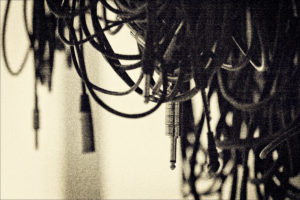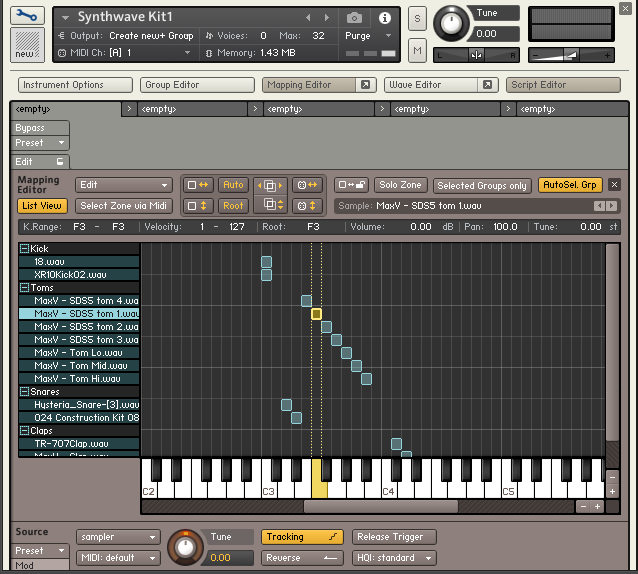
When I think of ‘fluidity’ I think of workflow, efficiency and productivity. How do you connect with your tools to create incredible auditory experiences? Most importantly; How efficient is this process? Working in audio we all know the dream scenarios we envision are far from reality. There’s always less time than we planned. Someone’s added a new animation and decided not to CC the audio team. Being able to blast out assets due to a clean and productive workflow is an essential part of game audio life. An efficient workflow can help alleviate the stress of development.
Software
So what to do? How can you speed up your workflow to take full advantage of that creative energy? Personally, I started looking at accessibility. What do my key commands look like, are they readily available or are they an awkward reach? Do things that I use consistently need macros? I looked at my plug-in list and sorted them
by relevance and type. What did I use the most? While I am big on customizing everything to fit your style and flow, I am also big on maintaining a level of clarity. If you came in blind to your setup after a week of not working, would you be able to pick up where you left off? Keep things custom yet clear.
Templates are a blessing; some people use them for everything. I personally don’t tend to use larger templates unless I’m working with music. Basic routing templates are a must for maximizing creative sound design flow. Consider building a custom Kontakt instrument with frequently used samples.
I just recently built a custom synthwave drum kit and couldn’t be happier with the results. Track presets. Track presets. Track presets. If you aren’t going to use a whole template at least have presets you can pull up for specific tracks with specific plugins. While plug-in presets are a great starting point, make your own! You can save your own custom presets in any plugin and recall at any time.

Hardware
I believe heavily in having a microphone setup and ready to roll always. I have a rode boom arm attached to my desk with any sort of mic plugged in and ready to record whenever the moment strikes. Combine that with a recording template and you’re free to get creative. The less you have in your way the more creative you can be. I can’t count how many times I had an idea in my head and lost it by the time I booted my PC and loaded up a session.
Hardware controllers are wonderful assets in speeding up your workflow. Whether it’s a motorized fader or just a macro slave, these devices shave minutes to even hours off your work. I employ an elgato stream deck for macros and other convenient commands such as launching programs or folders.
Getting in the zone
You have the perfect workflow, you’re key-binds are on point and your new controller makes you work twice as fast. For some reason you can’t lay down anything that sounds decent or anything at all for that matter. You know you must work on something today to meet deadline but it’s just not working. How do you get in the zone of working on something and take advantage of that awesome flow? I can only speak for myself, of course, but I’ll outline some things I do to get mentally in the game.
Getting into the groove is the hardest part of our jobs, I think. Game audio is a creative art that takes so much energy and that energy must be tuned and funneled for us to get results. It’s a frustrating and tiresome task. Maybe the project is nearing the end and you’re getting burnt out. Maybe you haven’t been as excited as you wanted to be about what you’re working on. Maybe your client hates everything you put out and has put you in a spiral. I find that trying to force assets out isn’t that answer. I take frequent walks, maybe grab another coffee. I often pace rooms and try to get a different angle on the task at hand. Take a break. I find my mind wanders to things that I want to get done i.e. read more of that book or watch an episode of that show you’re watching. Do it, read a chapter, watch the episode. Relax. I find if I just go do the thing that’s distracting me, I can better focus on the task at hand.
Try working from another spot in the project. Guns burning you out? Work on some character Foley. I find changing the pace of the day helps me solve unrelated problems. It helps free the mind up from overthinking. I find it helps me process information more efficiently when I’m not forcing myself to figure it out.
Throw it away. If something is not working, move on! You can make a good sound, sound great but you can’t make a bad sound, sound good. No matter how much time you put into something, be willing to start over. Pumping more time into a direction that’s not working is more harmful than just plain starting over. Saves your sanity too.

Conclusion
Know your tools, know your setup and above all make it work for YOU. Freelancing in game audio is great in the way that we aren’t usually forced to conform to standards or preconceived workflows. Even some larger studios are allowing people the freedom to make it their own. So branch out and settle into a flow that’s your own.